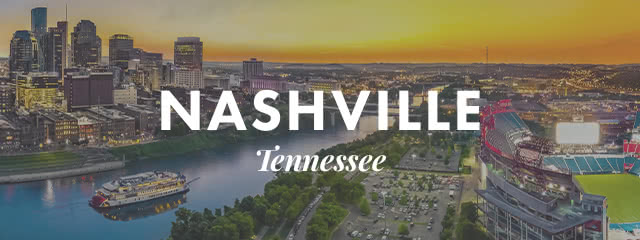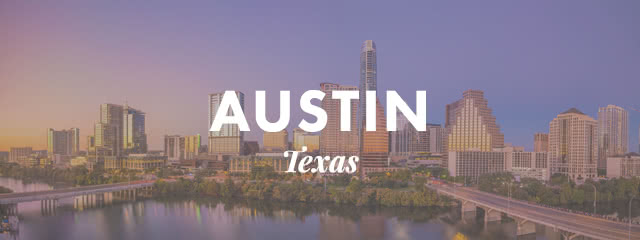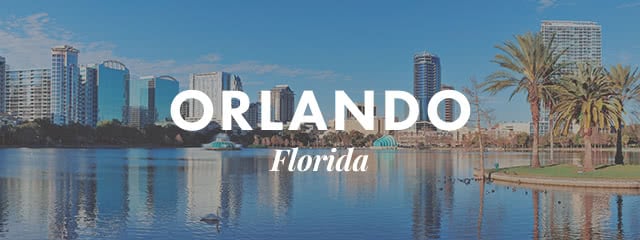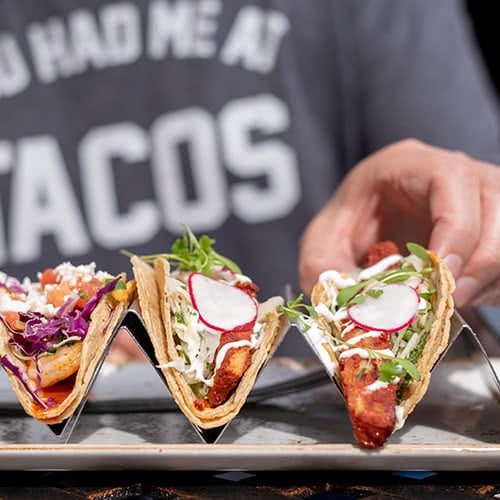Top 10 Food Truck Cities in America
Last updated on Jan 14, 2026Corrinn McCauleyDetermining the best cities for food trucks isn’t exclusively based on good weather and public interest. State-and-city-imposed fees, permits, and regulations heavily affect a food truck’s success and must be factored into your food truck business plan. So, where exactly are food trucks most successful?
We’ve rounded up the top 10 food truck cities in America. Click on any city’s name for its breakdown.
- Portland
- Denver
- Orlando
- Philadelphia
- Indianapolis
- Houston
- Austin
- Los Angeles
- New York City
- Nashville

How Profitable Are Food Trucks?
So far, the food truck industry's revenue in 2020 is $1.1 billion, and its market size has a greater rate of increase than the rest of the consumer goods and services sector. New and seasoned restauranteurs alike are interested in starting a food truck and tapping into the profitable mobile vending industry.
While experts predict that the food truck industry will continue to sky-rocket, how profitable food trucks are for their owners varies widely based on their city's licensing and operational procedures. Individual owners should evaluate their city's friendliness to food trucks before investing in their own.
Top 10 Best Cities for Food Trucks in America
While most cities have at least a handful of food trucks, some cities are more profitable for food truck owners and provide a friendlier environment for food truck operations. Learn more about the top 10 food truck cities in America for food truck operators.
10. Nashville, Tennessee

Music City, Athens of the South, Nash-Vegas, Nashville is known by many names, all of which bespeak its reputation as a cultural mecca for musicians, intellectuals, and late-night revelers alike. Nashville is the perfect environment for inventive food trucks to thrive.
Thankfully, the city of Nashville provides moderate regulations on food trucks, making it number 10 on the list of the most profitable cities for food trucks.
Operating a Food Truck in Nashville
- Registration: Food truck operations in Nashville face somewhat high registration fees and an additional water permit.
- City Acceptance: The cost of operating a food truck in Nashville is consistent with national averages. In a recent survey by the U.S. Chamber of Commerce Foundation,, food truck operators reported that officials are friendly to them at office visits, and that they’re only required to visit city offices an average of 15 times to run their food truck business.
- Vending Limitations: It is Nashville’s unusually high proximity limitations that keep it at the bottom of our top 10 best food truck cities in America list. Nashville food trucks cannot be within 150 feet of a building inhabited by either a full-service or fast-food restaurant.
9. New York City, New York

New York City is steeped in food truck history and is home to some of the best food trucks in the country. However, it's comparatively stringent food truck rules and regulations keep it from topping the list of the best cities for food trucks in America.
Operating a Food Truck in New York City
- Licensing Cap: New York City has placed a cap on the number of available food truck licenses, making it nearly impossible to legally obtain one. Food truck operators in New York City reported that acquiring a two-year vending permit often requires 15 years on the waiting list or paying over $25,000 to obtain one on the black market.
- Impossible Restrictions: Food trucks are not allowed to vend from metered parking. Not only are open parking spots hard to come by, they must also be 20 feet from a building’s entrances and 10 feet from crosswalks. These two restrictions combined make operating in Manhattan nearly impossible. Food truck operators reported that receiving $65 tickets from the police is just a part of operating a food truck in New York City.
- Extra Licenses: Every employee working in your food truck, from the cashier to the chef, is required to have a food handler's license and attend a health department class.
8. Los Angeles, California

As the birthplace of the modern food truck craze, one would expect Los Angeles to top the list of the best cities for food trucks in America. If you’re wondering where to get the best food truck food, Los Angeles may still be the answer. However, if you want to know where food trucks are most profitable, the outlandish expense of operating a food truck in Los Angeles prevents the city from topping the list of the best cities for food trucks.
Operating a Food Truck in Los Angeles
- Restrictions: Los Angeles doesn’t impose a lot of restrictions on where food trucks can operate. While food trucks cannot vend on public property, private lots are prevalent and there are few proximity restrictions for operating around schools and public parks. On the whole, Los Angeles has embraced the food truck market as a key element in its culture.
- Permitting Expenses: The biggest challenge Los Angeles food truck operators face is that their permit doesn't allow them to operate across the entire county. Obtaining multiple permits to operate across the metro area is extremely costly.
7. Austin, Texas

Thanks to their food truck friendly regulations, the capital of live music seems to be sharing another title these days: food truck capital of America. While Austin may not have as many food trucks as other major cities, they make up for it by producing some of the tastiest eats and offering a profitable market for food truck owners.
Operating a Food Truck in Austin
- One-Stop-Shop Permitting Process: On average, acquiring a food truck permit requires 20 steps and 14 trips to regulatory bodies, but Austin has eliminated this exhaustive process by creating a one-stop-shop for food truck licensing. Additionally license fees in Austin are comparatively lower than America’s other best food truck cities.
- Average Restrictions: While proximity limitations are in-line with national averages, each county surrounding Austin imposes different taxes and rules which add difficulties and expenses.
- Challenging Health Inspection Process: The most consistently reviled aspect of operating a food truck in Austin by food truck entrepreneurs is the city’s difficult health inspection process. A tight window for conducting your inspection is provided, and both the inspection itself and the ensuing approval process is lengthy.
6. Houston, Texas

While food trucks may not be the most practical dining option in ‘The Bayou City’ (they receive 53 inches of rain per year.) Houston's international residents and strong local traditions of Tex-Mex and BBQ are well-suited to the food truck industry. Thankfully, from residents' tastes to regulatory terms, Houston is a city where food trucks are profitable.
Operating a Food Truck in Houston
- Zoning: While Houston has no zoning code, Houston's food truck operators are prohibited from using street parking, cannot operate within 100 feet of a restaurant, and must remain 60 feet apart from fellow food trucks.
- Extra Commissary Fees: Commissary kitchens and storage spaces require food truck operators to visit daily whether they need to or not. Additionally, food truck owners must pay the commissary daily regardless of whether they operated their business on that day.
- Hidden Fines and Regulations: Houston food truck operators face additional and often unexpected fines such as an electronic monitoring fee. They are also required to submit notarized letters from the private properties where they operate stating that they have permission to use the location and that there are bathrooms on-site.
5. Indianapolis, Indiana

Most people will tell you that the food truck scene is best on either the west or east coast. However, Indianapolis proves that the midwest offers equally delicious and unique food truck options. Due to its comparatively limited restrictions, Indianapolis surpasses many coastal cities as a destination where food trucks are most successful.
Operating a Food Truck in Indianapolis
- Easy to Get Started: Its low food truck start-up fees and comparatively few required trips to regulatory offices make Indianapolis one of the best places to buy a food truck start a new food truck business.
- Simple Ongoing Compliance: It is easy to comply with Indianapolis’ food truck regulations since the majority of them are surrounding food safety and sanitation requirements. These safety and sanitation requirements are in line with the rest of Indiana’s standardized Administrative Code.
- Information Scarcity: While Indiapolis’s rules for starting a food truck help operators, information on how to start your business is not readily available on the city’s website. Finding the information requires scouring multiple websites and trudging through dense terminology.
4. Philadelphia, Pennsylvania

Home to numerous colleges and universities and imposed with few restrictions, Philadelphia food trucks are highly profitable. See why the City of Brotherly Love is one of America's top food truck cities.
Operating a Food Truck in Philadelphia
- Few Regulations: Food truck operators in Philadelphia enjoy an easy start-up process, few trips to licensing offices, and light regulatory procedures. Most of the regulations food truck operators must adhere to are universal safety and sanitation rules.
- Frequent Health Inspections: In addition to their annual review, food trucks must receive a health inspection for every large event they vend. On average, food truck operators in Philadelphia will receive between 10 and 30 inspections in a given calendar year.
- Difficult to Vend in Prime Locations: The Philadelphia food truck market is heavily saturated, so, acquiring approval to vend in the most profitable spots is difficult and can require years of waiting.
- Inconsistently Enforced Rules: Because Philadelphia's rules (such as the mandate that food trucks not park within 30 feet from each other and must not operate past midnight) are inconsistently enforced, food truck operators lose their competitive edge if they comply with rules and risk fines if they don’t.
3. Orlando, Florida

While Orlando is known for its theme parks, this Florida city is home to a lively foodie scene, and its rules and regulations make it one of the best cities where food trucks are most profitable. Orlando is the US city with the most food trucks per capita due to its friendliness towards trucks, earning it the number three spot on the top 10 food truck cities in America.
Operating a Food Truck in Orlando
- Most Affordable Operational and Permitting Fees: Orlando helps food truck vendors succeed by offering them unbeatable $50 permits, low on-going operational fees, and readily available compliance information on their local government’s FAQ page.
- Challenges and Limitations: Orlando food truck operators cannot sell food or merchandise on city streets or sidewalks. Additionally, vending across the metro area requires additional permits and inspections.
2. Denver, Colorado

Consistently ranked as America's fittest city, Denver's residents are drawn to food trucks that offer local, organic, and healthy food menus while they walk the streets for exercise. Denver is also one of America's fastest-growing cities, attracting young professionals and families. Combining the two essential elements for a food truck's success: a strong clientele base and food truck friendly rules and regulations, Denver is it the second-best city for food trucks in America.
Operating a Food Truck in Denver
- Straight Forward Startup Procedures: Denver aids food truck entrepreneurs by offering just 10 start-up procedures and requiring only a few trips to city offices to obtain approvals. Government permitting processes are transparent and easily navigated on government websites. On-going operational compliances are equally transparent and as easy to follow as start-up procedures.
- Altering Vehicles for Safety: To operate a food truck in Denver, owners must install fire suppression systems, change gas lines, and adjust propane tank sizes. Making mandated updates and repairs to comply with the rules can be costly. and requires a well-planned food truck layout.
- Complex Cross-Metro Operations: Operating your food truck across Denver’s metro area will incur additional regulatory costs and permitting fees. Additionally, you are required to file taxes in each city you operate within, which is both a hassle and an expense.
1. Portland, Oregon

Portland Oregan is the city where food trucks are most profitable, reigning our list of the top 10 food truck cities in America.
While they're commonly referred to as “food carts” in their neck of the woods, Portland boasts over 600 trucks and trailers serving up tantalizing treats. This “weird” city has so many carts that they have multiple food truck parks, like Cartlandia, Mississippi Marketplace, and Cartopia. The city of Portland embraces its food carts by making sure its food trucks are profitable so they can continue enriching the city's vibrant culture.
Operating a Food Truck in Portland
- Easy to Get Started and Easy to Operate: Portland helps food truck operators thrive by making licenses easy to obtain and making vending processes clear and easy to follow. Portland imposes no proximity limitations on food trucks nor do they impose sales taxes. Portland is hands down the best city for food truck operators in America.
- Effortless Vending: Downtown Portland has set aside many parking lots exclusively for food trucks. Additionally, the government invests resources into creating easily navigable procedures for remaining operable.
- Expensive Permits: While straightforward to obtain and easy to come by, Portland’s food truck permits aren’t cheap. Additional expenses are incurred by the requirement that operators obtain a special permit to cater an event. Without this permit, food truck operators must use a separate commissary kitchen to cater events and weddings .
- Water Tank Requirement: Food trucks must have a 50-gallon water tank on hand. While not all cities require this specific measure, food truck operators should create a food truck equipment checklist to make sure they always have the supplies they need.
How Did Food Trucks Get Their Start? Then and Now
Now that you know the top 10 food truck cities in America where food trucks are most profitable, you may be wondering how food trucks got their start. We've broken down the fast facts of both food truck history and the modern food truck craze. We then explain how you can incorporate the tactics of the modern food truck craze's top entrepreneurs and make your food truck business more profitable.
Food Truck History
The first known food truck was created in 1872 by a man named Walter Scott. Scott cut windows into his wagon and parked in front of a Providence, R.I. newspaper office where he sold sandwiches, slices of pie, and coffee to journalists who worked long and odd hours. For this same reason, parking near a college campus to serve students is profitable for modern food trucks.
While Scott created America's first food truck prototype, the New York City hot dog cart popularized America's street vending tradition. The history of the hot dog cart began in the 1860s with German immigrants serving sausages with milk rolls and sauerkraut from a cart in New York City's Bowery. In 1893, the first official hot dog cart was opened by Charles Feltment in Coney Island with tremendous success, 3,600 dachshund sausages were sold in Feltman’s first year.
Since NYC is largely responsible for popularizing street food in America, it’s no surprise that it is a top food truck city in the modern food truck craze. We’ve examined three of NYC’s best food trucks and provided tips on how to run a successful food truck.
Learning from the Best Food Trucks in New York City:
- The Cinnamon Snail: As the first vegan organic food truck in the US, The Cinnamon Snail set the industry standard for how to accommodate vegans and vegetarians and prove to meat-lovers that vegan food can be flavorful and delicious. Unfortunately, the Cinnamon Snail closed their food truck in 2020, but the legacy lives on in their cookbook, Street Vegan.
- The Halal Guys: The Halal Guys began serving a niche market in NYC and has since proven that a food truck can turn into a major franchise represented across the US. The secret to their success? They serve food that travels well and remains true to their roots by continuing to use certified halal meat even though approximately 95% of their current clientele is not Muslim. Perhaps the true secret is in their signature sauce. Having a signature sauce will draw customers to your establishment in even the most saturated market.
- Korilla BBQ: Korilla takes the spicy flavors of Korean barbecue and applies them to traditional Mexican dishes such as tacos and burritos. Korilla is an example of what a successful food truck marketing plan can do. Korilla has grown a social media platform of 28.6K Twitter followers and 18.3K Instagram followers by connecting with their client's values. Additionally, they've leveraged broadcasting exposure by appearing on TV shows such as Sesame Street and The Great Food Truck Race. They now boast several food trucks and a brick and mortar location.

Modern Food Truck Craze
The modern food truck craze began in LA circa 2008 with Kogi. Not only did Kogi kickstart the modern food truck craze, but they are also responsible for innovating the fusion food truck trend. Since Kogi's wild early success, LA has continued to pioneer America’s modern food truck craze. Follow top Los Angeles food trucks' patterns of success as you develop your own food truck business.
Learning from the Best Food Trucks in Los Angeles:
- Kogi: Arguably the spark that started the modern food truck movement, Kogi has been serving up Korean-Mexican fusion food since 2008. Kogi was the first to harness the power of Twitter in the food truck industry, setting the standard for how to leverage social media.
- Prince of Venice: While pizza may be common to food trucks, Prince of Venice fills the void for pasta. Prince of Venice combines Italian imports and locally sourced ingredients to deliver from scratch noodles and sauces. Its name is not just a clever moniker, it is run by Prince Emanuele Filiberto, the grandson of the last King of Italy, Umberto II. While you may not have royalty to leverage, Prince of Venice shows how combining authenticity and loyalty to one's heritage with fresh local ingredients earns a loyal following and tremendous success.
- Coolhaus: Woman-founded and led Coolhaus uses responsibly sourced ingredients to create innovative twists on classic ice cream pints and cookie sandwiches. They are the perfect example of how you can turn a menu item into an easy to consume, handheld dish. They’ve continued to partner with other female-owned businesses and show the power of women supporting women to achieve feats of entrepreneurship. They now boast several food trucks, brick and mortar locations, offer on-demand delivery (including next day air delivery), and their products are sold at retail locations.
Knowing where food trucks are most profitable and educating yourself on how pioneers of the modern food truck craze achieved success primes your food truck business for a lucrative future. We hope you use our guide to the top 10 food truck cities in America.to launch your food truck business with open eyes; ready to take advantage of the benefits your city provides and tackle the challenges it poses.



